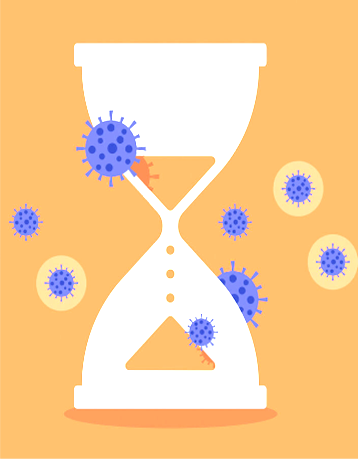Wittenberg et al., 2023
Long COVID Cystitis, known as COVID-associated cystitis (CAC), is the presentation of exacerbated
urinary symptoms such as increased urinary frequency, urinary urgency, frequent urination at night (nocturia), painful urination (dysuria) and/or urge incontinence post COVID-19 infection.
Seen in an increasing number of Long COVID patients, research is being conducted to increase
understanding of the impact of Long COVID on urological health and potential treatment options.
In a recent study, Using the American Urological Association’s Urology Care Foundation Overactive Bladder Assessment Tool, American researchers assessed 350 patients within age range 47-82 who had been hospitalised with COVID-19 infection and experienced new or worsening urinary symptoms post hospital discharge.
One proposed explanation of the pathogenesis of CAC is that increased inflammation in the bladder itself causes urinary tract symptoms. Another theory is that the SARS-CoV-2 virus directly invades
urothelial cells leading to viral cystitis (Urothelial cells line the inside of the ureter and urethra and
expand when the bladder is full and shrink when the bladder is empty). Another proposed theory is that pro-inflammatory cytokines when in contact with bladder mucosa cause increased sensitivity, leading to urinary tract symptoms. These cytokines (IL-6, IL-8 and IP-10) were found to be elevated in the urine of COVID-19 patients.
Due to Long COVID being a new condition, there are no published guidelines for managing CAC, and at this time there is no diagnostic test. Because inflammation appears to be the primary cause of CAC it is proposed that immunomodulators that decrease pro-inflammatory cytokines and increase
anti-inflammatory cytokines may help. Further research is required.
87% of participants showed significant improvement in their CAC symptoms after 21-28 months, giving reassurance that the issue can resolve over time. Conservative measures including behaviour
modification (not explained in the article) and Over Active Bladder medications were used.
Wittenberg, S., Vercnocke, J., Chancellor, M., Dhar, S., Liaw, A., Lucas, S., & Dhar, N. (2023). Prolonged impacts of COVID-19-associated cystitis: A study on long-term consequences. World journal of clinical cases, 11(33), 7987–7993. https://doi.org/10.12998/wjcc.v11.i33.7987


